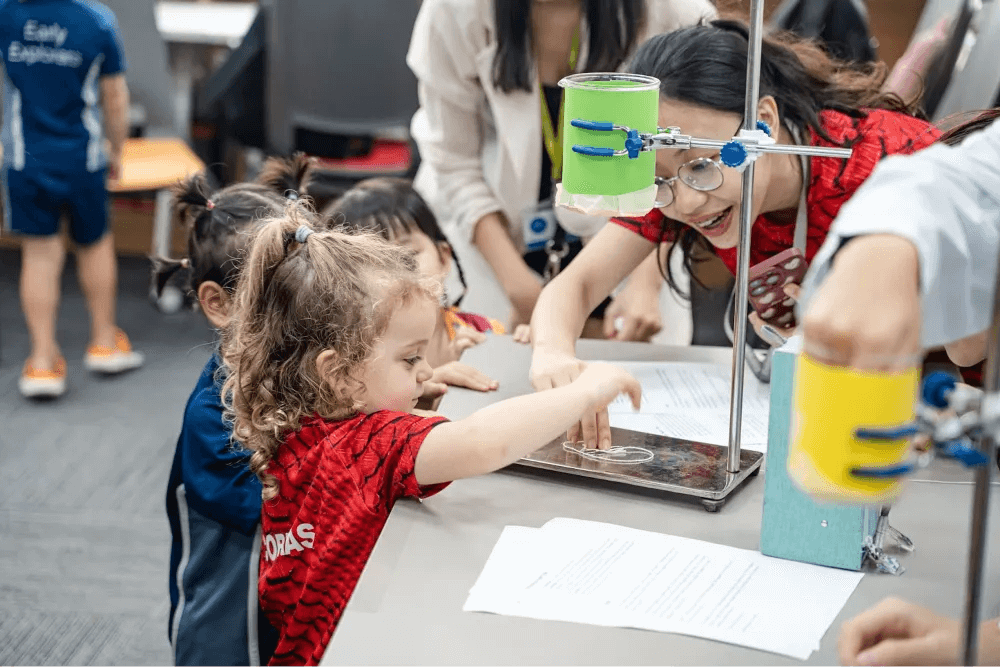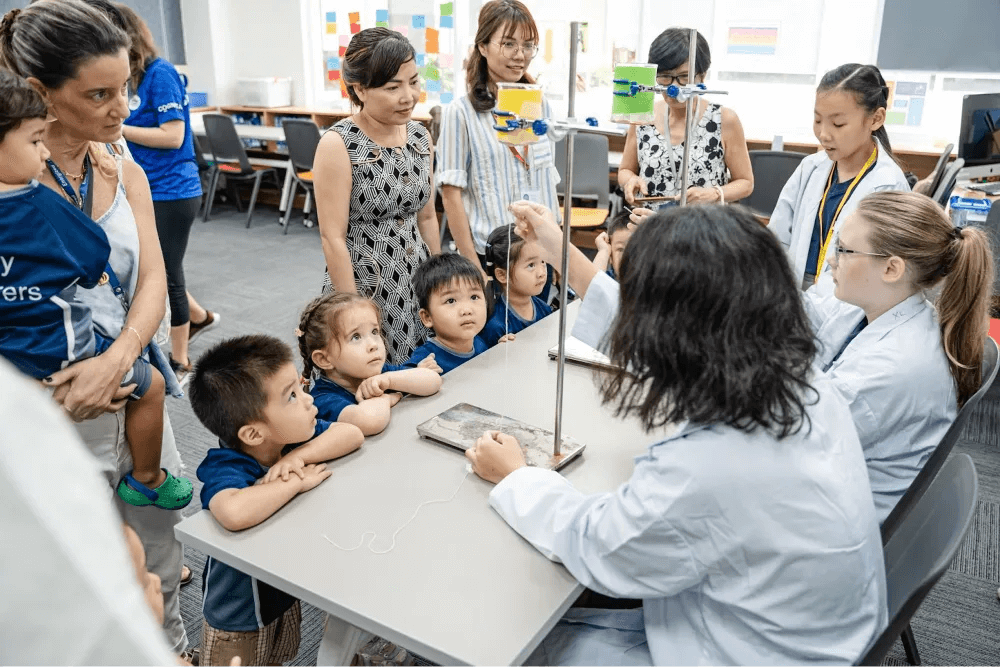7 Common Challenges in Early Childhood Education
Early childhood education (ECE) is a critical phase in a child’s development, laying the foundation for future learning and growth. However, educators and parents often face numerous challenges in ECE that can hinder this vital developmental process.
From limited resources and diverse learning needs to behavioral issues and varying levels of parental involvement, these obstacles require strategic approaches to ensure effective learning environments. This article explores seven common challenges in ECE, offering insights and potential solutions to enhance the educational experiences of young learners. Let’s get started.
The Importance of Early Childhood Education
Early childhood education (ECE) shapes a child’s future by promoting the stable growth of intellectual, emotional, social, and physical abilities.
The strategic mindset nurtured by ECE programs will support children in:
- Cognitive Development: Through interactive activities, playful exploration, and guided instruction, children enhance their language, problem-solving, and critical-thinking skills. Early childhood education programs often incorporate hands-on learning experiences encouraging children to explore their environment and engage in problem-solving tasks.
- Social and Emotional Development: Through interactions with peers and teachers, children learn essential social skills such as sharing, taking turns, and resolving conflicts. Early childhood education programs incorporate activities that promote emotional regulation and self-control, helping children manage their feelings constructively.

The Importance of Early Childhood Education
7 Challenges in Early Childhood Education
Despite the many benefits of early childhood education, educators and parents often face numerous obstacles. Understanding these challenges in early childhood education is essential for creating effective strategies and solutions to support young learners.
1. High Costs and Limited Availability of ECE Programs
The high costs and limited availability of early childhood education (ECE) programs present significant challenges in early childhood education. These developmental challenges are particularly pronounced across different income distributions, creating disparities in access and quality.

Key issues include:
- Varying Childcare Consumption: Higher-income households are more likely to pay for childcare compared to lower-income households. While some families receive subsidies, the average household with children under six spends $532 per month on childcare (according to Analysis of the National Survey of Early Care and Education (NSECE)). This number constitutes about eight percent of their income. This figure rises to $920 per month, or approximately 13 percent of their income, for households that pay for childcare.
- High Cost to Provide High-Quality Childcare Service: The high costs of providing high-quality care in Early Childhood Education (ECE) are primarily due to the industry’s labor-intensive nature. This reliance on families’ payments, coupled with limited options for increasing revenue or reducing operating costs, presents significant challenges to investing in quality improvements.
- High Price of Formal ECE Programs: Pricing in the ECE sector and consumers’ sensitivity to these prices can result in families opting out of market-based ECE services. Instead, they may turn to informal, unpaid, and often lower-quality care alternatives, impacting overall accessibility to quality childcare.
- Business Model Fragility: The ECE sector is characterized by business model fragility, with many small firms and sole proprietorships. These entities face substantial startup costs and operate with thin profit margins, making them particularly susceptible to economic downturns and financial instability.
2. ECE Staff’s Mental Health Issues
The rise in mental health concerns among children further exacerbates the mental health issues faced by early childhood education (ECE) staff. Several factors contribute to the low mental health of early childhood educators, including:

- High Levels of Responsibility: Early childhood educators are tasked with the comprehensive development and well-being of young children, requiring patience and dedication. The significant responsibility can lead to heightened stress levels as educators strive to meet each child’s diverse needs.
- Constantly Evolving Field: The field of early childhood education is continually changing, with new teaching methods, curriculum updates, and technological advancements. Educators must adapt quickly to these changes, which can contribute to stress and burnout.
- Behavioral Challenges: Managing disruptive classroom behaviors, such as tantrums and conflicts, adds to the stress. Young children are still developing emotional regulation, making it challenging for educators to handle these situations effectively.
- Long Working Hours: To accommodate working parents’ schedules, early childhood educators often work extended hours. The lack of work-life balance can exacerbate stress and affect overall well-being.
- Physically Demanding Work: The job involves a lot of movement and hands-on activities, requiring physical stamina to keep up with energetic young learners.
- Sensitive Issues: Educators frequently encounter sensitive issues such as behavioral disorders, abuse, and trauma. Addressing these situations demands a high level of emotional maturity and sensitivity.
- Constant Adaptation: The evolving field of early childhood education necessitates continuous learning and adaptation to new teaching methods and technologies, which adds to educators’ stress and workload.
These factors collectively impact the mental health of ECE staff, underscoring the need for better support and recognition of their crucial role in child development.
3. Limited Resources and Accesses to Professional Development
Addressing limited resources and access to professional development will enhance the effectiveness of early childhood educators and support their career advancement.

- Limited Access to High-Quality Professional Development: A small proportion of teachers engage in highly valued professional development activities. Only 26.6 percent attend university courses related to teaching, 23.1 percent present at workshops, and 21.6 percent make observational visits to other schools (Emma García and Elaine Weiss, 2019).
- Insufficient Time and Resources for Preparation: Novice and veteran teachers often lack the time and resources needed for reflective practice and preparation. Only 37.1 percent of first-year teachers are given time away from classroom instruction for support activities, 26.9 percent receive aides for classroom management, and just 10.7 percent benefit from reduced teaching schedules. Additionally, only half of all teachers receive time off for professional development, with even fewer receiving financial support for conferences, workshops, or college tuition.
- Low Satisfaction with Professional Development: Many teachers are dissatisfied with their professional development experiences. Less than a third find the activities they engage in “very useful”, and over a third of novice teachers report that mentoring is only somewhat helpful or not helpful at all.
- Lack of Involvement in Learning Communities: Teachers often do not have significant influence over their teaching practices or professional development programs. Over two-thirds of teachers report limited influence over classroom content and instructional materials, and only 11.1 percent feel they have substantial input into professional development programs.
Addressing these challenges can help educators improve the quality of early childhood education and support the professional growth of educators.
4. Low Parent Engagement and Communication
Early Years staff often face significant challenges in early childhood education related to low parent engagement and communication, which can impede the effectiveness of early childhood education programs.

- Lack of Understanding of Home Learning Importance: Some parents may not recognize the value of their involvement in their child’s education. The lack of awareness can be exacerbated by time constraints and competing priorities, such as work and appointments, which limit their ability to engage consistently.
- Influence of Parents’ Own School Experiences: Parents who had negative school experiences may model similar attitudes for their children, affecting their level of engagement with educational settings.
- Cultural and Language Differences: Communication barriers arise when families speak different languages or have varied cultural expectations regarding Early Years education. Misunderstandings can lead to reduced engagement if parents do not fully grasp school expectations or feel excluded from the educational process.
- Barriers to Confidence and Mental Health: Parents dealing with issues like anxiety, shyness, or low self-esteem may find it challenging to interact with educational settings.
Addressing these challenges in early childhood development involves fostering an inclusive approach to parental engagement and creating strategies that accommodate diverse needs and backgrounds.
5. Heightened Safety Concerns
Heightened safety concerns have become significant challenges in early childhood education, impacting both educators and students.

These concerns are driven by several factors:
- Physical and Environmental Risks: Early childhood settings often contain numerous physical and environmental hazards, which can lead to increased stress and fatigue. Educators must constantly monitor these dangers to ensure the safety of young children, who range from a few months to six years old.
- Safety Protocols and Procedures: Implementing and adhering to safety protocols, such as new check-in procedures and emergency response plans, adds to the workload of early childhood educators. The need to adapt to evolving safety measures can create additional stress.
- Lack of Resources for Safety Measures: Insufficient funding often limits the ability to invest in adequate safety resources and training. Many centers struggle to afford the necessary equipment or programs to enhance safety, adding to the burden on staff.
- Balancing Safety and Education: Educators face the challenge of balancing safety concerns with providing a nurturing educational environment. Ensuring that safety measures do not detract from the quality of educational experiences is a persistent challenge.
Addressing these safety concerns requires comprehensive strategies, including improved funding, enhanced safety protocols, and support for educators’ mental health to create a safer and more supportive learning environment for both staff and students.
6. Socialization Difficulties
Social-emotional skills are crucial for a child’s development, yet several challenges in early childhood education can impede their progress:

- Anxiety: Anxiety can hinder a child’s ability to interact confidently with peers and participate in group activities.
- Attachment Problems: Difficulties in forming secure attachments may affect a child’s ability to trust and engage socially.
- Trauma: Past trauma can lead to emotional and behavioral issues that disrupt social interactions and emotional regulation.
- Autism: Children with autism may struggle with social communication and understanding social cues, impacting their interactions.
- Attention-Deficit Hyperactivity Disorder (ADHD): ADHD can affect a child’s impulse control and attention span, making social interactions more challenging.
Early identification and intervention can support children in overcoming these obstacles and developing strong social-emotional skills.
7. Technology Adoption Challenges
Teachers face several challenges in early childhood education in integrating technology into their teaching:

- Improper Access: Limited access to devices, software, and reliable internet can hinder effective technology use.
- Uncertainty About Standards: Ambiguity regarding technology standards can create confusion about appropriate usage.
- Unfavorable Attitudes: Some educators have reservations about technology use with young children, impacting adoption.
- Lack of Time: Teachers often lack the time needed to integrate technology effectively into classroom activities.
- Insufficient Training: Inadequate training on purposeful technology use can prevent effective implementation.
- Rapid Technological Changes: Fast-paced developments in technology and poor communication between developers and educators create challenges in keeping up with new tools and applications.
Teachers’ Practices to Support Early Childhood Education
To effectively support early childhood education, teachers must implement practices grounded in research and developmentally appropriate principles.

These practices involve decisions at all levels, including policy, administration, and daily classroom activities.
- Creating a Caring Community of Learners: Establish a supportive learning environment by fostering consistent, positive relationships among teachers, children, and families. A caring community enhances children’s emotional and cognitive development, ensuring that all members contribute to each other’s well-being and learning.
- Teaching to Enhance Development and Learning: Balance adult-guided and child-guided experiences to promote optimal development. Teachers should provide structured activities based on their goals while allowing children to explore their interests, thus supporting both structured and self-directed learning.
- Planning Curriculum to Achieve Important Goals: Develop a curriculum that reflects developmental and educational objectives through varied learning experiences such as play and group activities. Ensure the curriculum is well-planned and written, allowing teachers to design engaging activities aligned with educational goals while maintaining flexibility for individual needs.
- Assessing Children’s Development and Learning: Conduct assessments that are aligned with the curriculum and program goals. Use assessments to monitor progress and adapt teaching strategies to meet each child’s developmental and educational needs, considering cultural and linguistic contexts.
- Establishing Reciprocal Relationships with Families: Build strong partnerships with families to gain insights into each child’s background and needs. Avoid limiting family involvement to scheduled events; instead, foster ongoing, reciprocal relationships that recognize and incorporate parents’ knowledge and perspectives.
These practices ensure that early childhood education is both effective and responsive to the needs of young learners and their families.
Mitigate Challenges in Early Childhood Education with ISHCMC
ISHCMC International Primary School addresses the diverse needs of early childhood education through its Primary Years Programme (PYP). This approach ensures that learning is engaging, relevant, challenging, and significant by utilizing a transdisciplinary model.
The PYP framework incorporates global themes to create meaningful connections between subject areas, allowing young learners to explore big ideas in an integrated manner. This holistic method helps mitigate common challenges in early childhood education, such as limited resources and diverse learning needs.

To experience how ISHCMC can support your child’s educational journey, we encourage you to apply and join our vibrant learning community.
Reference:
Emma García and Elaine Weiss (2019). The role of early career support, continuous professional development, and learning communities in the teacher shortage. https://files.epi.org/pdf/164976.pdf
Mitigate Challenges in Early Childhood Education with ISHCMC
ISHCMC International Primary School addresses the diverse needs of early childhood education through its Primary Years Programme (PYP). This approach ensures that learning is engaging, relevant, challenging, and significant by utilizing a transdisciplinary model.
The PYP framework incorporates global themes to create meaningful connections between subject areas, allowing young learners to explore big ideas in an integrated manner. This holistic method helps mitigate common challenges in early childhood education, such as limited resources and diverse learning needs.

To experience how ISHCMC can support your child’s educational journey, we encourage you to apply and join our vibrant learning community.
Reference:
Emma García and Elaine Weiss (2019). The role of early career support, continuous professional development, and learning communities in the teacher shortage. https://files.epi.org/pdf/164976.pdf






